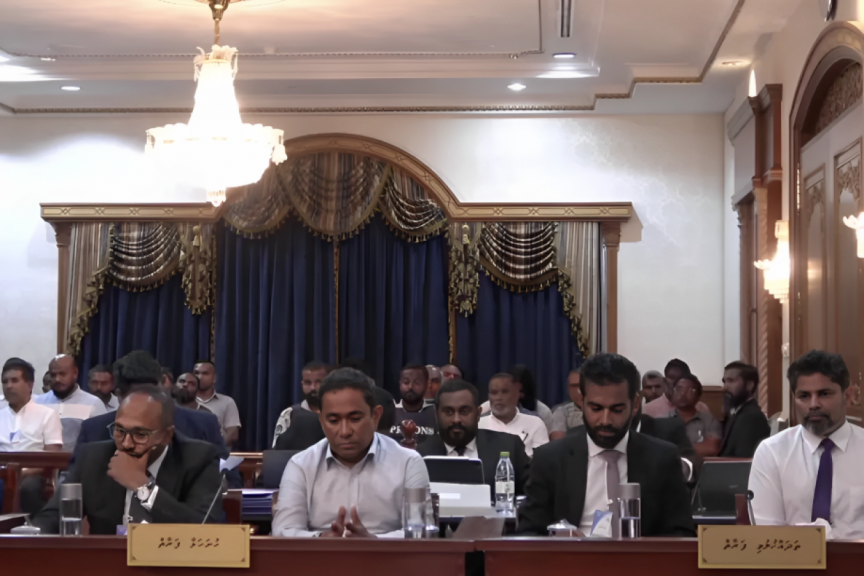
Former President Abdulla Yameen Abdul Gayyoom during a previous Supreme Court hearing: Prosecution argues new evidence against Yameen in Aarah case dismissed unlawfully.
The prosecution, on Wednesday, argued at the Supreme Court that the new evidence submitted by the state against former president Abdulla Yameen Abdul Gayyoom in the Aarah money laundering case was dismissed by the High Court unconstitutionally.
Yameen was sentenced to 11 years in prison on December 25, 2022, on charges of bribery and money laundering in connection to the sale of V. Aarah. The High Court overturned the conviction on April 18, citing major legal irregularities.
But instead of a full exoneration, the court overturned the two convictions and ordered a retrial in the case.
Yameen was accused of accepting a bribe from former Felidhoo MP Yoosuf Naeem for the sale of Aarah. During the original trial, Yameen During the original trial, the lower court accepted the admission of new witnesses by the prosecution to counter the testimony of the defense witnesses who testified claiming the transaction pertained to a USD exchange.
The High Court, in its April ruling, instructed the lower court to disregard the new state witnesses. The prosecution filed an appeal with the Supreme Court, citing High Court disregarded the witnesses unconstitutionally.
Hearings in the appeal commenced at 9:00am on Wednesday during which state prosecutor Ahmed Shafeeu argued that the High Court’s decision was contradictory to Article 143 of the constitution which stipulates that lower courts are mandated to abide by the precedents set forth by higher courts.

Moreover, he said the High Court’s decision was also contradictory to the precedent set forth by Supreme Court in the case of Ali Zubair v Et al.
In this regard, he detailed that precedent establishes the option to complete and amend accordingly if a procedure has not been completed or completed with irregularities.
Shafeeu said when High Court ordered to disregard the new witnesses, it had been during a procedural case and henceforth, something which can be amended. As per Shafeeu, in circumstances surrounding procedural cases on new evidence, both sides should be able to present their respective arguments following which the lower court should decide whether to accept the evidence or not. He noted that the opportunity was there during the Criminal Court trial.
In light of this, Shafeeu said the prosecution was seeking to overturn High Court’s decisions to dismiss the evidence and to allow a decision on the matter to be reached at the lower court following debate.

Responding to the prosecution’s arguments, Yameen’s lawyer, Hamza Latheef said the submission of evidence during the wrong stage of a trial warrants the dismissal of the evidence. He added that the prosecution, in this case, was seeking to submit new evidence to respond to testimonies delivered by witnesses; something which Hamza said violates the right to fairness guaranteed by the constitution. He further said the High Court reached its decision by evaluating the evidence as evidence that had been submitted for the purpose of responding to witness testimonies.
Emphasizing that his client’s rights have been infringed by the prosecution’s actions, Hamza said the Supreme Court will be encouraging a party that has committed a great injustice if they were to rule in the appeal in favor of the prosecution.
A three-justice bench is presiding over the appeal; Justice Aisha Shujoon, Justice Dr. Azmiralda Zahir and Justice Dr. Mohamed Ibrahim.